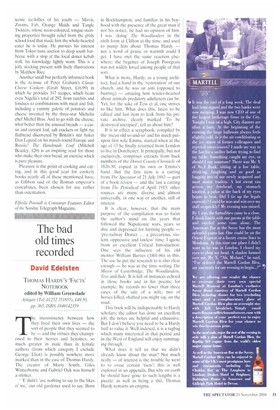The bad old times recorded
David Edeisten
THOMAS HARDY'S 'FACTS' NOTEBOOK edited by William Greenslade Ashgate (Tel: 01252 351855), £49.50, pp. 365, ISBN 1840142359 The inconsistency between how they lived their own lives — the sort of people that they seemed to be — and the virtues they championed in their heroes and heroines, so much greater in male than in female authors (from which category I exclude George Eliot) is possibly nowhere more marked than in the case of Thomas Hardy. The creator of Marty South, Giles Winterborne and Gabriel Oak was himself a stinker.
'E didn't 'ave nothing to say to the likes o' we,' our old gardener used to say. Born in Bockhampton, and familiar in his boyhood with the presence of the great man if not his notice, he had no opinion of him. I was 'doing' The Woodlanders in the sixth form at Clifton at the time, and used to pump him about Thomas Hardy — not a word of praise or warmth could I get.. I have met the same reaction elsewhere: the begetter of Joseph Poorgrass was not widely loved among people of that sort.
What is more, Hardy, as a young architect, had a hand in the 'restoration' of our church, and he was an anti (opposed to hunting) — amazing how tender-hearted about animals predatory adulterers can be. Yet, for the sake of Tess et al, one strives to like him. What does this, latest to be edited and last item to leak from his private archive, clearly marked 'To be destroyed uncopied', tell us about him?
It is in effect a scrapbook, compiled by the 'mean old so-and-so' and his much putupon first wife Emma, started when at the age of 43 he finally returned from London to live in Dorchester. It principally, hut not exclusively, comprises extracts from back numbers of the Dorset County Chronicle of 1826-30, copied in his own or Emma's hand. But the first item is a cutting from The Spectator of 21 July 1883 — part of a hook review — and the last a cutting from The Periodical of April 1913: other sources are many, diverse and almost universally, in one way or another, still of interest.
It is clear, however, that the main purpose of the compilation was to focus the author's mind on the years that followed the Napoleonic wars, years so dire and depressed for farming people — 'pre-railway Dorset ... a precarious, violent, oppressive and lawless' time: I quote from an excellent Critical Introduction. One sees the influence of his old mentor William Barnes (1801-86) in this. The use he put the research to is also clear enough — he was at the time writing The Mayor of Casterbridge, The Woodlanders, Tess and Jude. It is full of instances echoed in those books and in his poems; for example, he records no fewer than three cases of the sale of a wife, two of horses killed, shafted you might say, on the road.
This book will be indispensable to Hardy scholars; the editor has done an excellent job, the notes are helpful and exhaustive. But I don't believe you need to be a Hardy buff to value it. Well-indexed, it is a ragbag which many interested in that period and in the West of England will enjoy rummaging through.
What does it tell us that we didn't already know about the man? Not much really — of interest is the trouble he went to to erase certain 'facts': this is well explored in an appendix. But why on earth he should have gone to such lengths is a puzzle: as well as being a shit, Thomas Hardy remains an enigma.


























































































 Previous page
Previous page